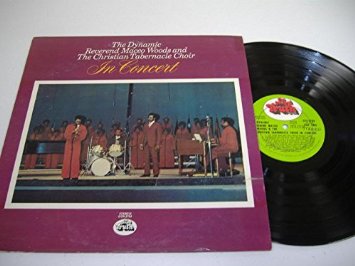1. Reverend Maceo WoodsThe Dynamic Reverend Maceo Woods And The Christian Tabernacle Choir In Concert

Reverend Maceo Woods was really the way I discovered gospel music. I was in the Bahamas recording with Talking Heads, the first album I did with them [More Songs About Buildings And Food] and I used to listen to the radio in my little apartment I had there before we started recording, and I’d tune into these distant mainland American stations and one morning I tuned into this song, which was called ‘Surrender To The Wheel’. I thought, "Wow! What does that mean?" and those words kept going round in my head, it sounded so sort of Inquisition and medieval or on the other hand, cosmic. Surrender to the cosmic wheel of things. Anyway, I didn’t record the song but I could remember the chorus, so I remember going into shops singing it to people and finally someone said, "Oh, that’s not ‘surrender to the wheel’, that’s ‘surrender to His will’!" [repeats in affected accent] "His weeyill!", and that’s how I bought this album.
I loved this album so much, and in particular this one singer on it, this voice that just drove me insane. That was was Doris Sykes. So after buying all the Reverend Maceo Woods albums I could get – and they weren’t that easy to get – I started thinking that, really, the thing was Doris Sykes, that was what I was interested in. She has this real insane vibrato, it’s just dizzy, kind of mad. It’s like somebody who is completely gone [laughs]. Something that you only ever hear in Gospel music really, and in early rock & roll you hear it sometimes as well.
With gospel, why do you feel so deeply affected by it? It being a religious music and you –
– not being religious. Well, there’s something I like about it as a music form, which is that it involves a lot of people who aren’t professionals. Most of the people you hear in the recordings are not being paid anything. I think that really makes a difference. They’re there as a kind of community who are there for some other reason than ‘this is my job’. Nearly everybody there has a day job and so I kind of like the idea that people really are doing this for the sheer commitment of it. They don’t have to do it. They could be doing something else with their time. This is the one time of the week for those people when, suddenly, they can be this person and you can hear that incredible liberation coming out of it.
I was worried about it at first. Why am I so moved by a music based on something that I just don’t believe in? What I started to think was that one of the things we humans like doing is surrendering. We love to be in a situation where we’re out of control, in a sort of controlled form. We constantly pitch ourselves into situations like books, or films, or sex, or drugs, or music, where we’re taken somewhere where we didn’t expect to go and it’s amazing. It’s lovely to do it with a group of other people who are also being taken.
I think that kind of consolidates something very important in humans, which is the idea that we are good at two things: we’re good at controlling – we know that because of all our technologies and our ability to take over the world and fuck it up – but we’re also good at letting ourselves go and being carried along with things. If you think about it, that must be what animals mostly have to do. Animals can’t take control of their affairs in the way that we can. But what they can do is learn how to go with the flow. They pick up on things, they’re sensitive, they’re intuitive in ways that we admire and would like to be. But to be like that you have to surrender. You have to stop trying to push the control button all the time. You have to say, "Okay, I’m not in control anymore. I’m going with it."
Ideally, what you’re doing on the axis between control and surrender is you’re finding the right place to be at any moment in your life. Sometimes you can take control, sometimes you can do precisely what you wanted to do without interference. There are lots of times in your life where that isn’t going to be possible so you have to have another strategy and that involves some kind of surrender. Partly having faith in the other people who are with you, but also having faith in everything. The basic message of gospel is ‘everything’s gonna be alright’, and that’s a fantastic message. A message of optimism. All of these songs, if you listen to them, even the ones that are quite gloomy, they’re really saying ‘it’s gonna be alright’. You’ll get through it. That’s the message I want to hear.


